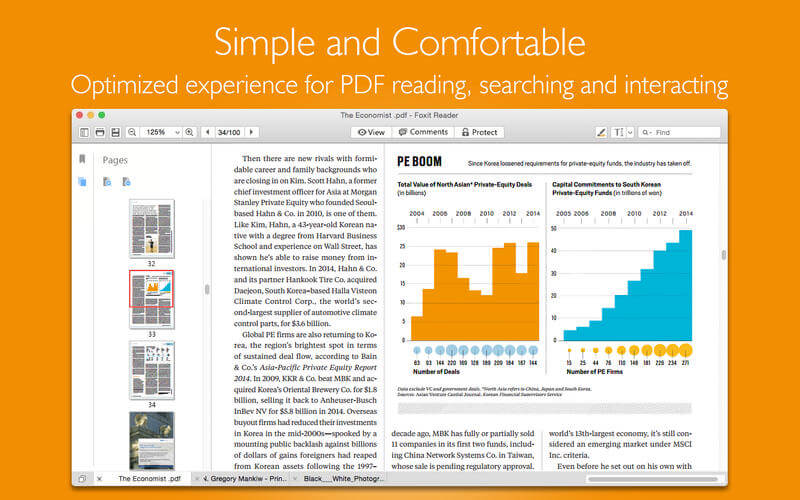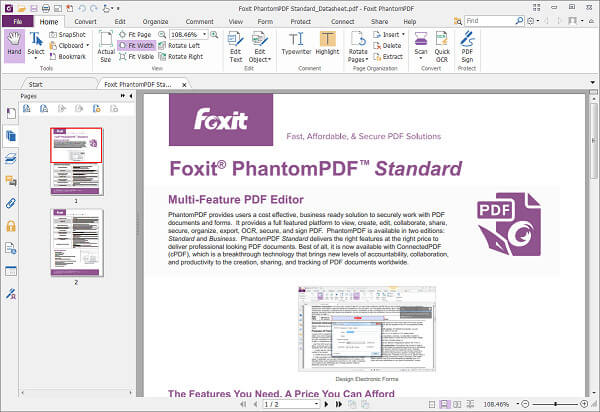
- #FOXIT PDF READER ADD ONS PATCH#
- #FOXIT PDF READER ADD ONS SOFTWARE#
- #FOXIT PDF READER ADD ONS CODE#
- #FOXIT PDF READER ADD ONS FREE#
- #FOXIT PDF READER ADD ONS WINDOWS#
#FOXIT PDF READER ADD ONS SOFTWARE#
The software market is competitive, and a recent IBM study argued that developers are not necessarily experts in security.
#FOXIT PDF READER ADD ONS PATCH#
The researchers did not report any instances of users being impacted by the flaws, but they noted that a patch is available that covers all 18 vulnerabilities.
#FOXIT PDF READER ADD ONS CODE#
Once any of the 18 security vulnerabilities has been triggered, however, remote code execution attacks could allow attackers to run commands on the victim’s system. To execute the attack, the researchers noted that, in most cases, the cybercriminals would first need to fool a Foxit user into opening a malicious file. Threat actors can take advantage of this window of opportunity - dubbed a “free-after-use” condition - to execute arbitrary code to steal data or perform other malicious actions.
#FOXIT PDF READER ADD ONS FREE#
How Could the Security Vulnerabilities Be Exploited?Ĭlosing a document can free up used objects embedded in the JavaScript code while the engine continues to operate. The vulnerabilities are primarily found in the product’s JavaScript engine, which was designed to support interactive and dynamic documents, such as PDFs.

This loads the file into a separate Foxit reader process, avoiding the buggy code in the plugin DLL.Īs Steve Jobs might have said, not that big of a deal.įollow on Twitter for the latest computer security news.A free browser plugin for creating, editing and viewing PDF files contains 18 security vulnerabilities that could expose users to remote code execution, researchers warned.Īccording Cisco Talos, the Foxit PDF Reader, which is often used in place of Adobe’s Acrobat application, was designed to securely open protected documents and notify users when new versions of a PDF have been created. You will then need to click the OK button. You’ll get an intermediate dialog saying: PDF files will no longer open directly inside your browser. Go to Tools|Add-ons at the Firefox menu, choose the Plugins tab and click the Disable button against the Foxit Reader Plugin for Mozilla. I’ve seen stories online suggesting that, since there’s no patch yet, you might consider switching to a different PDF reader.īut since the bug isn’t in the reader itself (and there’s no exploit yet, anyway), there’s a quicker and simpler mitigation you can use that will let you stick with Foxit. Below, for example, the query part is the string download=true:įoxit has yet to comment on this issue on its security advisories, though I am sure it will soon do so. The query component is usually used to identify parameters submitted to a server-side script. If a link contains a question mark, the query is the text that follows it. The buffer overflow happens in the code that processes the link, triggering a crash when the link includes an overly-long query string.

You just have to feed it a malformed link that, when clicked, serves up an HTTP reply that advertises itself as a PDF. Intriguingly, you don’t actually need to feed Foxit a PDF to provoke the crash. Ironically, the first example of such a plugin for Netscape was written at…Adobe Systems. → The np at the start of the filename stands for “Netscape Plugin”, a plugin architecture that originated in the heady days of Netscape Navigator. That’s not good.įoxit openly promotes its PDF reader as a secure platform that “ insures worry free operation against malicious virus ”, which may sound like a bold statement in the face of Micalizzi’s bug.īut there is still literal truth in Foxit’s claim: the bug is not in the PDF reader itself, but in the npFoxitReaderPlugin.dll file that acts as the glue between the browser and the reader. The crash, which is a side-effect of a stack overflow, pretty much lets you write to a memory location of your choice.
#FOXIT PDF READER ADD ONS WINDOWS#
(I used Firefox 18.0 with Foxit Plugin 2.2.1.530 on Windows XP3.) Micalizzi hasn’t actually produced a proof-of-concept exploit, but I was able to reproduce his result at will. Here’s an example: Italian security researcher Andrea Micalizzi has recently sought, and found, a possibly-exploitable vulnerability in the latest Foxit PDF plugin for Firefox. You can therefore expect other vendors of PDF software to start feeling some of the heat that would probably have been aimed entirely at Adobe in years gone by.

That’s because Adobe’s PDF reader has long been the most prevalent product in the marketplace, and the most heavily targeted by attackers and researchers.īut there are plenty of challengers in the PDF software market, and it’s important to remember that just “being different” is not enough to deliver security on its own.Īlso, since Adobe released Reader X, with its security-oriented sandbox, crooks and researchers alike have found Adobe’s PDF nut much harder to crack. When you think of PDF vulnerabilities and exploits, the first word that comes to mind is probably Adobe.


 0 kommentar(er)
0 kommentar(er)
